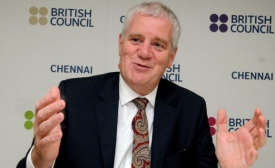british council
Nearly everyone likes cultural diplomacy in principle, but some remain skeptical about its value. It is seen by many as soft power at its softest, safe and fuzzy, with more aesthetic rewards than diplomatic ones.
For those of us committed to using cultural diplomacy as a significant force in advancing the national interest, that kind of condescending view is aggravating and we always welcome solid evidence that it is wrong.

The USC Center on Public Diplomacy was pleased to welcome Martin Davidson, CEO of the British Council, the UK’s cultural relations organization to discuss international cultural relations in the 21st Century.
In order for soft power to be effective, however, you need a foundation of trust between countries. This can be a problem with traditional forms of cultural diplomacy, which are often perceived as being merely vehicles for sweetening the appeal of government policy. If a country is perceived to be overly self-interested as it deploys soft power, its efforts will fall flat.
Over the past decade, governments have become increasingly aware of the importance of "soft" power ... as a complement to the "hard" power of traditional military and economic means of achieving foreign policy objectives. Today in Westminster Hall I will be debating how we can develop a foreign policy strategy that better integrates the different elements of hard and soft power.
The British Council Colombo has served as the educational bridge between Sri Lanka and the United Kingdom for some 60 years now, specializing in language studies, and strengthening educational and cultural exchange between the two nations. Now it is preparing to undergo a complete refurbishment.
The main idea of this multilateral project lies in opening as many communications channels as possible between Kosovo and the ‘difficult’ states who still keep their doors closed to a normal governmental and civil communication but also to help the society...
Cultural diplomacy, or the more pejorative alternative – cultural imperialism, has become important player in global events. Cultural diplomacy may be seen as a tenet of international relations. It is one of the ‘soft’ aspects of state interactions. This is dissimilar to the ‘hard’ items of statutes, treaties, blocks, pacts, multilateral bodies and the military.
With constitutions in many countries being rewritten or reframed, there's a chance to enshrine those aspirations into law. The British Council has been working for many years with Middle Eastern partners to improve women's access to education and economic benefit...







